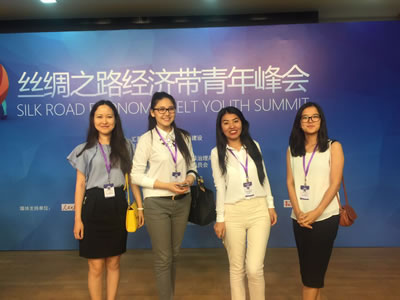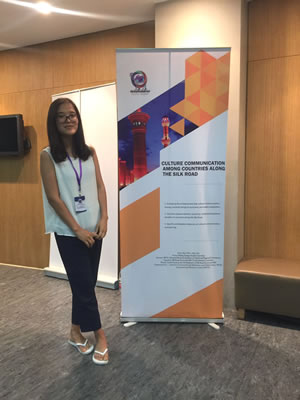--A USTC International Student Reports from Silk Road Economic Belt Youth Summit
From 19 to 21 May at the Beijing Foreign Studies University hosted the first Youth Summit of the Silk Road Economic Belt (SREBYS). The main objective of the summit was the creation of a platform for young people from countries along the Silk Road Economic Belt. The theme of the summit was 'The power of youth in the development of the Silk Road Economic Belt'.
Foreign students from different universities in China came to participate in the summit, and I get involved on behalf of international students studying the University of Science and Technology of China (USTC). I am as a student from Kazakhstan which has a special meaning for the establishment of the Silk Road Economic Belt had the opportunity to participate in the summit. The summit was followed by about 100 foreign students from different universities of China. Organizers have divided all delegates into 4 committees. I was in Committee-3 where delegates came from China, Kazakhstan, Kyrgyzstan, Mongolia, Nepal, Russia and Turkey. The main topic of discussion was the “Cultural Communication of the countries along the Silk Road Economic Belt”. The topic aimed at discussing the strategic importance of cultural communication and learning among Silk Road and to find possible answers on how to find the right balance between similarities and differences in the process and how to contribute to effective policy coordination between countries.

In present days’ cultural communication is the part of international diplomatic cooperation. It serves as the object of achieving the goals of foreign policy of the country. Cultural communication will be highly conducive to understanding and promoting political mutual trust between countries. Each delegate of the country had received a report according to the topic. I’ve made a report about the Cultural Communication between Kazakhstan and China in the framework of the Silk Road Economic Belt.
The Silk Road Economic Belt is a global project which based on a Win-Win strategy where the main points of the project are political convergence, infrastructure, free trade, circulation of capital and the rapprochement of peoples. In the project of Silk Road Economic Belt Ethnic groups are going to be a key link in the development of cultural communication between the countries which will impact to further political and economic relations. Similarity of languages, religion and traditions can have an optimistic impact on the success of communication in future trade relations and political trust between countries in the framework of the project. Kazakhstan borders with China through Xinjiang province and population in Xinjiang consist mostly representatives of the Turkic nation group. These ethnic minorities include a number of relations with Kazakhstan and other Central Asian states such as similarity of language and religious connections. Ethnic and cultural community of the peoples’ growths the opportunity of good neighborly relations, that means Xinjiang going to promote cultural communication between the two countries in the framework of SREB which will affect in future trade and economic cooperation. The report basically pointed out the benefits of the Silk Road Economic Belt to the economy of Kazakhstan and the role of Xinjiang there. According to the reports of each delegate from different countries, I want to note that, each country sees itself as a major country in the establishment of the Silk Road Economic Belt.

Thanks to the summit, all student delegates got a lot of useful information about Silk Road Economic Belt and the problems faced in the creation of the project. I really hope that next year can participate in this summit again.
(By Aigul Islamjanova, Master student in School of Public Affairs, USTC, 2017-05-25)